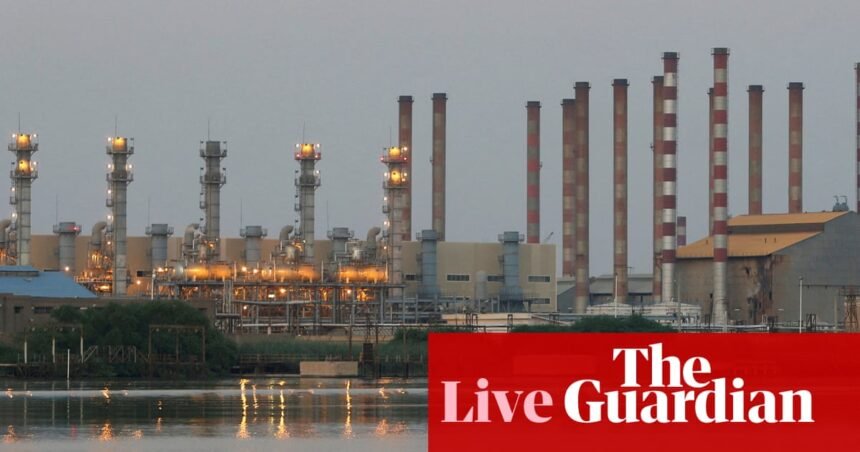Introduction: Oil price rise is “adverse shock” to global economy.
Good morning, and welcome to our rolling coverage of business, the financial markets and the world economy.
With the oil price rising again today, as attacks between Israel and Iran continue, economists are warning that the global economy faces an adverse shock, at an already difficult time for growth.
Oil prices have risen this morning, up around 1%, as the conflict between the two countries enters a fourth day.
Fears of disruption to supplies – a risk, if the Strait of Hormuz was to be closed – are making the oil price volatile. After a 7% surge on Friday, Brent crude is up another 0.5% on Monday morning at $74.60 per barrel, towards the five-month high touched early last Friday.
Iran accounts for about 3% of global oil supplies, while roughly 20% of global oil and LNG flows through the Strait of Hormuz, making it a crucial artery for the global economy.
Traders have noted that an Iranian gas field in the Persian Gulf was hit on Saturday, prompting Iran’s foreign minister to accuse Israel of seeking to expand the war beyond Iran.
Mohamed El-Erian, economic advisor to insurance giant Allianz, says the conflict risks causing slower global growth, increased inflationary pressure, reduced “policy flexibility” for central banks, and “further gradual erosion of the global order”.
He warned yesterday:
Two days into intensifying hostilities, both the probability and potential severity of these four effects have risen, confirming the notion that, in economic terms, this constitutes an adverse shock to an already fragile global economy.
Stock markets are, so far, showing some resilience on Monday. Japan’s Nikkei 225 index has gained over 1% today, while China’s markets are a little hgher.
Wall Street is set to open a little higher too; Tony Sycamore, analyst at IG, explains:
While the situation in the Middle East remains fluid, US S&P500 equity futures are trading about 0.95% higher this morning at 6036, likely buoyed by Israel’s early success in targeting Iran’s nuclear facilities, air defences, missile production, and military leaders to cripple strategic capabilities.
Additionally, while Israel has targeted Iranian energy infrastructure used domestically, it has refrained from targeting key Iranian oil export infrastructure.
The agenda
Key events
Oil prices are pushing a little higher – Brent crude is now up almost 1% at $74.90 per barrel.
Markets rise despite Middle East tensions
European stock markets have begun the new week with modest gains, despite the attacks between Iran and Israel continuing.
In London, the FTSE 100 share index is 17 points (+0.2) higher at 8868 points.
Oil companies BP (+1.4%) and Shell (+1.4%) are among the FTSE 100 risers, tracking the rise in crude prices. Mining companies are also higher. Betting firm Entain has jumped 6% after lifting its forecasts for revenues and profits from its US joint venture, BetMGM, this morning.
In Germany, the DAX index gained 0.08%, while France’s CAC has jumped 0.3%.
Jochen Stanzl, chief market analyst at CMC Markets, reports that there is caution in the markets:
Investors are exercising caution following a weekend marked by mutual attacks between Israel and Iran. However, a complete sell-off has not materialized. The market currently anticipates a limited conflict, though there is little indication that hostilities will end quickly. It is expected that fighting will continue unabated this week, albeit on a limited scale.
Investors should not harbor hopes for a quick resolution to the situation in the coming days. Uncertainty in the market typically leads to increased volatility because planning becomes more challenging. The risk of an escalation beyond localized retaliatory actions remains; this includes the possibility of Iran targeting energy facilities, which could result in a sharp rise in oil prices. If oil prices surge past $100 per barrel again, Germany could face the threat of recession once more.
UK drivers could soon feel the impact of escalating tensions in the Middle East at the petrol station.
Brent crude oil has risen from below $64/barrel at the end of last month to around $74.50 this morning, which typically leads to higher fuel prices.
Thomas Pugh, economist at leading audit, tax and consulting firm RSM UK explains:
“Just as tensions and uncertainty around global trade and tariffs seemed to be easing with a deal between the US and China on tariffs, the Israel/Iran escalation represents a new source of geopolitical tension. The main way this will impact UK businesses and the economy is through higher oil and natural gas prices. Indeed, oil prices have risen by about $10 per barrel (pb) in the last week. The most immediate impact will be on prices at the pump. A $10pb rise in oil prices will probably result in a 5p increase in pump prices over the next couple of months.
“A rough rule of thumb is that a $10pb rise in the price of a barrel of oil eventually adds 0.1% to inflation as higher fuel prices make their way through the system. Natural gas prices have also risen, but by a slightly smaller amount.
“However, to put this into context. This time last year oil prices were around $85pb and they are still way off their 2022 peaks of over $120pb. If oil prices stay at around these levels, it’s unlikely to make much of a difference to the Bank of England and the path for interest rates or economic growth this year.
Gold price eases back
The price of gold, a classic safe-haven asset, has dropped back today – perhaps a sign that market anxiety is easing.
As we blogged on Friday, gold jumped immediately after Israel launched its attack on Iran, as investors dashed into safer assets.
That move has slightly unwound today, wih gold down 0.5% at $3,415 per ounce.
It feels significant that gold remains below its alltime high, $3,500. Should it rise over that point, it will be a sign that the relative calm in the markets has fizzled out.
Markets in ‘surprisingly muted response’ to intensifying Middle East tensions.
As things stand… the oil price rally remains “limited” today amid mounting Middle East tensions, reports Ipek Ozkardeskaya, senior analyst at Swissquote Bank.
Ozkardeskaya explains:
Headlines were busy over the weekend as hostilities between Iran and Israel continued. An Iranian gas field in the Persian Gulf was hit on Saturday, fueling concerns that the escalation could spill over into global energy markets. While the damage appears limited to Iran’s domestic supply, the targeted gas processing facilities are linked to offshore oil production sites, potentially threatening broader energy flows.
US crude opened the week above $76 per barrel, and Brent crude briefly pushed above $84 per barrel. However, both benchmarks quickly gave back gains. Natural gas also spiked at the open, breaking above its 100-day moving average, before retreating. The US dollar edged higher on haven flows, while gold, which opened at record levels, is also paring gains.
The early trading reaction points to a surprisingly muted response from markets despite intensifying Middle East tensions.
Introduction: Oil price rise is “adverse shock” to global economy.
Good morning, and welcome to our rolling coverage of business, the financial markets and the world economy.
With the oil price rising again today, as attacks between Israel and Iran continue, economists are warning that the global economy faces an adverse shock, at an already difficult time for growth.
Oil prices have risen this morning, up around 1%, as the conflict between the two countries enters a fourth day.
Fears of disruption to supplies – a risk, if the Strait of Hormuz was to be closed – are making the oil price volatile. After a 7% surge on Friday, Brent crude is up another 0.5% on Monday morning at $74.60 per barrel, towards the five-month high touched early last Friday.
Iran accounts for about 3% of global oil supplies, while roughly 20% of global oil and LNG flows through the Strait of Hormuz, making it a crucial artery for the global economy.
Traders have noted that an Iranian gas field in the Persian Gulf was hit on Saturday, prompting Iran’s foreign minister to accuse Israel of seeking to expand the war beyond Iran.
Mohamed El-Erian, economic advisor to insurance giant Allianz, says the conflict risks causing slower global growth, increased inflationary pressure, reduced “policy flexibility” for central banks, and “further gradual erosion of the global order”.
He warned yesterday:
Two days into intensifying hostilities, both the probability and potential severity of these four effects have risen, confirming the notion that, in economic terms, this constitutes an adverse shock to an already fragile global economy.
Stock markets are, so far, showing some resilience on Monday. Japan’s Nikkei 225 index has gained over 1% today, while China’s markets are a little hgher.
Wall Street is set to open a little higher too; Tony Sycamore, analyst at IG, explains:
While the situation in the Middle East remains fluid, US S&P500 equity futures are trading about 0.95% higher this morning at 6036, likely buoyed by Israel’s early success in targeting Iran’s nuclear facilities, air defences, missile production, and military leaders to cripple strategic capabilities.
Additionally, while Israel has targeted Iranian energy infrastructure used domestically, it has refrained from targeting key Iranian oil export infrastructure.







